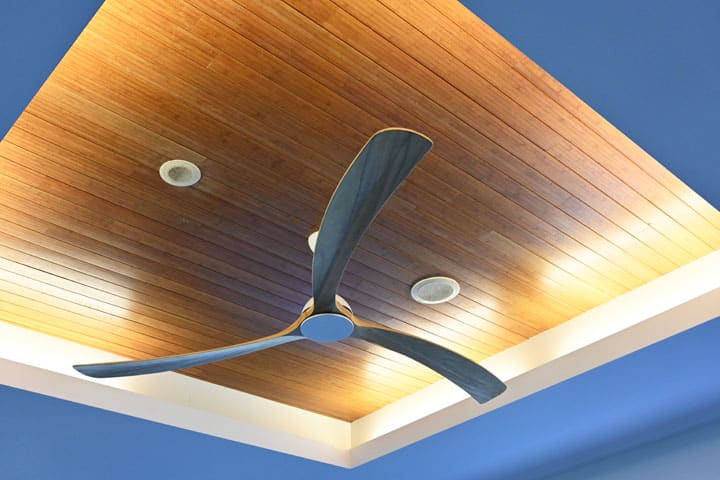You switch on your ceiling fan expecting quiet comfort, but instead, there is that familiar hum or buzz. It is a sound many Australian homeowners recognise, often leaving them unsure whether it is harmless or a sign of a problem. A ceiling fan hums or makes noise for many reasons, including blade imbalance, loose screws, or wiring faults that may require professional ceiling fan repair services.
While it may seem like a small issue, that sound can signal wear, poor installation, or even electrical danger. Ignoring it could lead to reduced efficiency, wasted energy, or further damage. In this guide, we will explain why your ceiling fan creates noise, what it means, and when to contact a licensed electrician. You will also discover safe, practical steps to stop the sound and keep your fan running smoothly and quietly.
Understanding Why Your Ceiling Fan Makes Noise
Ceiling fans are meant to run quietly, so any unusual humming or vibration is a clear signal that something is not quite right. A ceiling fan hums or makes noise when one or more internal parts become loose, unbalanced, or electrically faulty. These noises might start faintly but often grow louder over time. Understanding the cause helps you decide whether a quick DIY fix will do or if a licensed electrician should step in.
Loose Screws or Blade Imbalance
The constant motion of spinning blades slowly loosens screws on the housing, mounts, and brackets. When this happens, the fan makes noise when rotating, creating a repetitive clicking or low hum. Using a screwdriver to tighten all screws and ensuring each blade sits at the same height can usually solve this issue before it worsens.
Worn Motor Bearings
The small bearings inside the fan motor allow smooth, friction-free movement. As they wear down, friction increases and creates a persistent ceiling fan noisy problem. The sound may become louder on higher speeds, often described as grinding or humming. Lubricating the bearings can help, but if the noise persists, replacement may be required to avoid long-term motor damage.
Faulty Wiring or Electrical Issues
Sometimes the humming originates from within the wiring or capacitor. Poor electrical connections or deteriorated insulation can cause an ongoing buzz or faint electrical hum. These faults should only be inspected by a qualified electrician to ensure the fan remains safe to operate.
Dirt, Dust, or Poor Maintenance
Dust, pet hair, and debris can collect around blades and bearings, unbalancing the fan. A thorough clean restores balance and prevents recurring ceiling fan noise, improving both performance and energy efficiency.

Why It Matters to Fix Ceiling Fan Noise
A noisy ceiling fan might seem like a small inconvenience, but those sounds often point to underlying issues that affect both safety and performance. Taking the time to address unusual vibrations or hums protects your electrical system, extends the fan’s life, and ensures your home remains quiet, efficient, and safe for your family.
Prevents Electrical Hazards
A humming fan can sometimes indicate a wiring or capacitor problem. If left unchecked, it could lead to short circuits or overheating. Addressing the fault early helps avoid unnecessary electrical risks and keeps your system operating safely. Always have electrical components checked by a licensed electrical service provider rather than attempting repairs yourself.
Reduces Wear and Tear
When a ceiling fan making noise is ignored, the internal parts continue to vibrate and grind against one another. Over time, this strain accelerates wear on the bearings, motor, and mounting hardware. Resolving noise issues early prevents expensive repairs, helping your fan perform smoothly and reliably for years.
Improves Energy Efficiency
A properly balanced fan operates more efficiently, circulating air evenly without strain. Eliminating friction or imbalance reduces energy use and lowers your electricity costs. Keeping the fan quiet also ensures your cooling system works at maximum performance throughout Australia’s warmer months.
Keeps Your Home Peaceful
Unwanted mechanical noise can disrupt rest, sleep, and concentration. Fixing it restores comfort and peace within your home, creating a quieter environment for work or relaxation.
How to Fix a Noisy Ceiling Fan Safely
When a ceiling fan hums or makes noise, it is tempting to ignore it or attempt a quick fix. However, safety should always come first. Some minor problems can be managed at home, while others need professional attention. Here are practical steps to address different types of ceiling fan noise while keeping safety in mind.
Tighten Loose Screws and Blades
Loose screws or misaligned blades are often responsible for clicking or wobbling. Switch off the fan and carefully tighten all visible screws around the housing, brackets, and blades. This simple maintenance step often reduces ceiling fan noise caused by imbalance or vibration. If the sound continues, the problem may be deeper within the motor assembly.
Clean and Lubricate the Fan Motor
Dust and grime build-up can increase friction and wear. Wipe the blades, motor housing, and vents gently using a soft cloth. Lubricate the bearings if your fan allows it. Regular care not only removes humming but extends the motor’s life. If noise persists, the issue might need a noisy ceiling fan fix from a licensed residential electrician.
Check for Proper Mounting and Alignment
Make sure the mounting bracket and ceiling box are firmly attached. A loose mount can make the entire fixture shake, producing rattling or humming sounds. Correct alignment eliminates wobble and creates smooth airflow. Addressing this promptly prevents long-term structural wear and unnecessary vibration throughout the room.
Call a Licensed Electrician for Wiring Issues
Electrical humming or buzzing often means wiring problems or a failing capacitor. This is not a DIY task. Only a licensed electrician should handle wiring faults, replacements, or inspections. A professional will know how to fix ceiling fan noise safely and restore quiet operation while ensuring compliance with Australian safety standards.

When to Call a Licensed Electrician
Some fan noises are easy to resolve with cleaning or tightening, but others point to serious electrical or mechanical faults. If your ceiling fan hums or makes noise even after maintenance, it may need professional attention. Here are clear signs that it is time to call a licensed electrician for a proper electrical inspection and repair services.
Persistent Humming After Tightening or Cleaning
If you have tightened every screw, balanced the blades, and cleaned the fan but the humming continues, there may be an internal wiring or capacitor issue. Electrical noise does not disappear on its own, and ignoring it increases the risk of motor failure or electrical hazards.
Burning Smells or Sparks
If you notice a faint burning smell, flickering lights, or small sparks near the fan, turn it off immediately. These are signs of overheating wires or insulation damage. Never ignore these warning signs, as they can quickly lead to fire risks. A professional will know how to fix noisy ceiling fan problems safely and effectively.
Fan Speed Problems or Flickering Lights
Fluctuating speeds or flickering lights often suggest capacitor faults or voltage irregularities. These problems require diagnostic tools and replacement parts that only electricians should handle. Knowing when to fix a noisy ceiling fan professionally helps prevent damage to your electrical system and keeps your home safe.
Old or Poorly Installed Fans
If your fan is old or was installed without proper support, replacement is often the best option. Modern fans are quieter, safer, and more efficient, making them a worthwhile upgrade.
Preventing Future Fan Noise
The best way to stop a ceiling fan hums or makes noise problem is to prevent it before it starts. With regular maintenance and professional inspections, you can keep your fan operating smoothly and avoid costly repairs. Follow these practical habits to extend its lifespan and maintain a quiet, comfortable environment.
Regular Cleaning and Inspection
Dust and debris cause blades to lose balance and strain the motor. Clean the fan at least every few months and inspect it for loose screws or wobbling. Basic cleaning often prevents issues related to how to fix a noisy ceiling fan and keeps your fan in top condition.
Balance Blades Every Six Months
Unbalanced blades are one of the most common reasons for vibration. Using a blade balancing kit or checking alignment twice a year helps maintain steady, noise-free rotation.
Replace Worn Bearings Promptly
If you start hearing grinding or friction, the bearings might be wearing out. Replacing them early prevents another ceiling fan noisy issue and helps maintain smooth airflow throughout your space.
Book Annual Electrical Safety Checks
Have a licensed electrician inspect your fan and electrical system yearly. Regular maintenance prevents faults and ensures compliance with Australian electrical safety standards.
Conclusion: Stop the Humming Before It Gets Worse
If your ceiling fan hums or makes noise, it is never something to ignore. Even a faint hum can be the first sign of imbalance, loose screws, or internal wiring problems. Leaving it unchecked can shorten the fan’s lifespan, increase energy costs, and create safety hazards.
Addressing the issue early ensures your fan stays efficient, quiet, and reliable. Regular maintenance, careful cleaning, and professional inspections are the key to long-term performance. Whether the noise is caused by worn bearings, a loose mount, or electrical faults, identifying the cause quickly keeps your home comfortable and safe. When in doubt, always rely on a licensed electrician for expert help and peace of mind.
Call Powerhub Electrical for Ceiling Fan Repairs
If your ceiling fan hums or makes noise, Powerhub Electrical is ready to help. Our licensed electricians provide safe, reliable ceiling fan repairs, installations, and electrical maintenance across Epping and Parramatta. We identify the cause of the noise, fix it quickly, and ensure your fan runs quietly and efficiently again.
With 24/7 emergency availability, same-day service, and a reputation for honest, upfront pricing, our team delivers professional results every time. Do not wait for that hum to turn into a serious fault. Call Powerhub Electrical today on 0400 332 331 to schedule an inspection or repair. Experience prompt service, expert advice, and lasting electrical solutions from your trusted local electricians.





